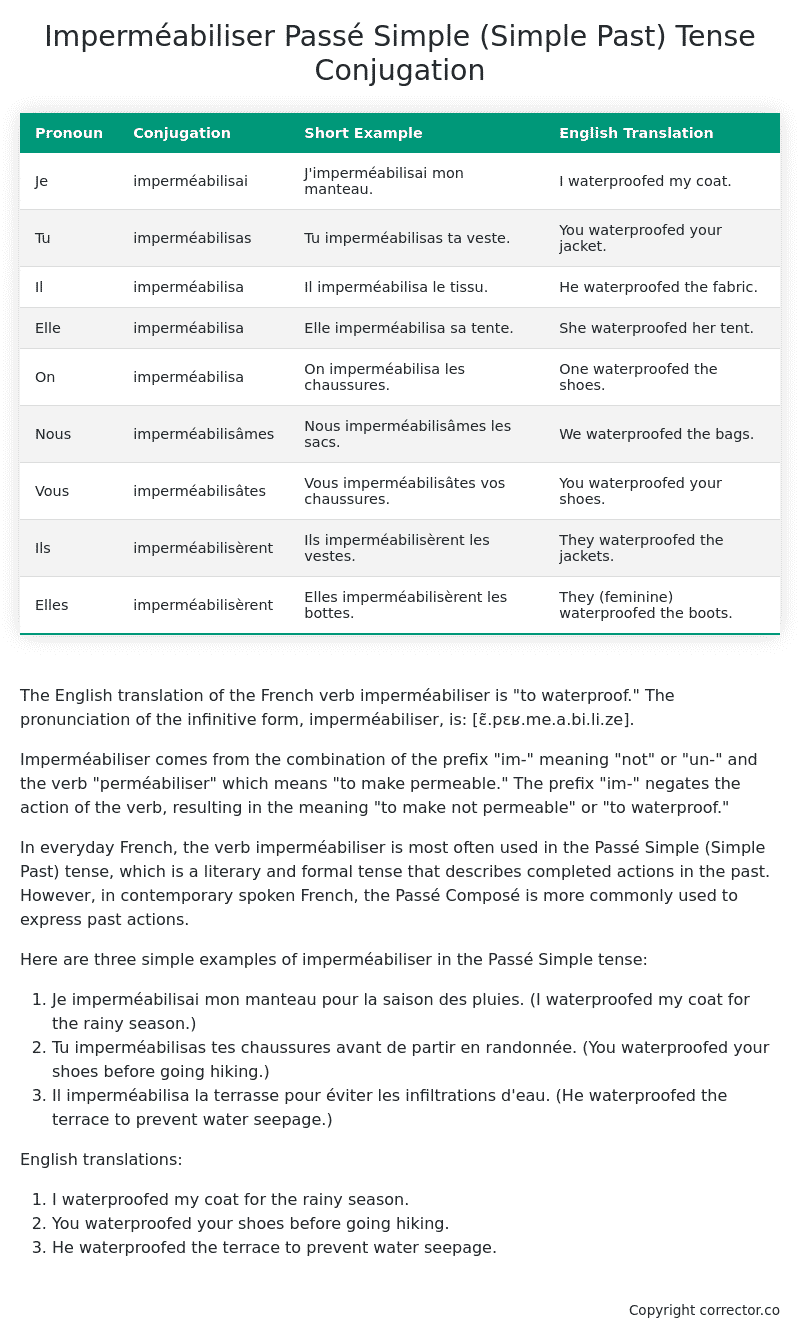Passé Simple (Simple Past) Tense Conjugation of the French Verb imperméabiliser
Introduction to the verb imperméabiliser
The English translation of the French verb imperméabiliser is “to waterproof.” The pronunciation of the infinitive form, imperméabiliser, is: [ɛ̃.pɛʁ.me.a.bi.li.ze].
Imperméabiliser comes from the combination of the prefix “im-” meaning “not” or “un-” and the verb “perméabiliser” which means “to make permeable.” The prefix “im-” negates the action of the verb, resulting in the meaning “to make not permeable” or “to waterproof.”
In everyday French, the verb imperméabiliser is most often used in the Passé Simple (Simple Past) tense, which is a literary and formal tense that describes completed actions in the past. However, in contemporary spoken French, the Passé Composé is more commonly used to express past actions.
Here are three simple examples of imperméabiliser in the Passé Simple tense:
- Je imperméabilisai mon manteau pour la saison des pluies. (I waterproofed my coat for the rainy season.)
- Tu imperméabilisas tes chaussures avant de partir en randonnée. (You waterproofed your shoes before going hiking.)
- Il imperméabilisa la terrasse pour éviter les infiltrations d’eau. (He waterproofed the terrace to prevent water seepage.)
English translations:
- I waterproofed my coat for the rainy season.
- You waterproofed your shoes before going hiking.
- He waterproofed the terrace to prevent water seepage.
Table of the Passé Simple (Simple Past) Tense Conjugation of imperméabiliser
| Pronoun | Conjugation | Short Example | English Translation |
|---|---|---|---|
| Je | imperméabilisai | J’imperméabilisai mon manteau. | I waterproofed my coat. |
| Tu | imperméabilisas | Tu imperméabilisas ta veste. | You waterproofed your jacket. |
| Il | imperméabilisa | Il imperméabilisa le tissu. | He waterproofed the fabric. |
| Elle | imperméabilisa | Elle imperméabilisa sa tente. | She waterproofed her tent. |
| On | imperméabilisa | On imperméabilisa les chaussures. | One waterproofed the shoes. |
| Nous | imperméabilisâmes | Nous imperméabilisâmes les sacs. | We waterproofed the bags. |
| Vous | imperméabilisâtes | Vous imperméabilisâtes vos chaussures. | You waterproofed your shoes. |
| Ils | imperméabilisèrent | Ils imperméabilisèrent les vestes. | They waterproofed the jackets. |
| Elles | imperméabilisèrent | Elles imperméabilisèrent les bottes. | They (feminine) waterproofed the boots. |
Other Conjugations for Imperméabiliser.
Le Present (Present Tense) Conjugation of the French Verb imperméabiliser
Imparfait (Imperfect) Tense Conjugation of the French Verb imperméabiliser
Passé Simple (Simple Past) Tense Conjugation of the French Verb imperméabiliser (You’re reading it right now!)
Passé Composé (Present Perfect) Tense Conjugation of the French Verb imperméabiliser
Futur Simple (Simple Future) Tense Conjugation of the French Verb imperméabiliser
Futur Proche (Near Future) Tense Conjugation of the French Verb imperméabiliser
Plus-que-parfait (Pluperfect) Tense Conjugation of the French Verb imperméabiliser
Passé Antérieur (Past Anterior) Tense Conjugation of the French Verb imperméabiliser
Futur Antérieur (Future Anterior) Tense Conjugation of the French Verb imperméabiliser
Subjonctif Présent (Subjunctive Present) Tense Conjugation of the French Verb imperméabiliser
Subjonctif Passé (Subjunctive Past) Tense Conjugation of the French Verb imperméabiliser
Subjonctif Imparfait (Subjunctive Imperfect) Tense Conjugation of the French Verb imperméabiliser
Conditionnel Présent (Conditional Present) Tense Conjugation of the French Verb imperméabiliser
Conditionnel Passé (Conditional Past) Tense Conjugation of the French Verb imperméabiliser
Conditionnel Passé II (Conditional Past II) Tense Conjugation of the French Verb imperméabiliser
L’impératif Présent (Imperative Present) Tense Conjugation of the French Verb imperméabiliser
L’impératif Passé (Imperative Past) Tense Conjugation of the French Verb imperméabiliser
L’infinitif Présent (Infinitive Present) Tense Conjugation of the French Verb imperméabiliser
L’infinitif Passé (Infinitive Past) Tense Conjugation of the French Verb imperméabiliser
Le Participe Présent (Present Participle) Tense Conjugation of the French Verb imperméabiliser
Le Participe Passé (Past Participle) Tense Conjugation of the French Verb imperméabiliser
Struggling with French verbs or the language in general? Why not use our free French Grammar Checker – no registration required!
Get a FREE Download Study Sheet of this Conjugation 🔥
Simply right click the image below, click “save image” and get your free reference for the imperméabiliser Passé Simple tense conjugation!

Imperméabiliser – About the French Passé Simple (Simple Past) Tense
Formation
Usage
Narration
Historical Context
Interactions with other tenses
Passé Composé
Imparfait
Conditional and Subjunctive
Summary
I hope you enjoyed this article on the verb imperméabiliser. Still in a learning mood? Check out another TOTALLY random French verb conjugation!


